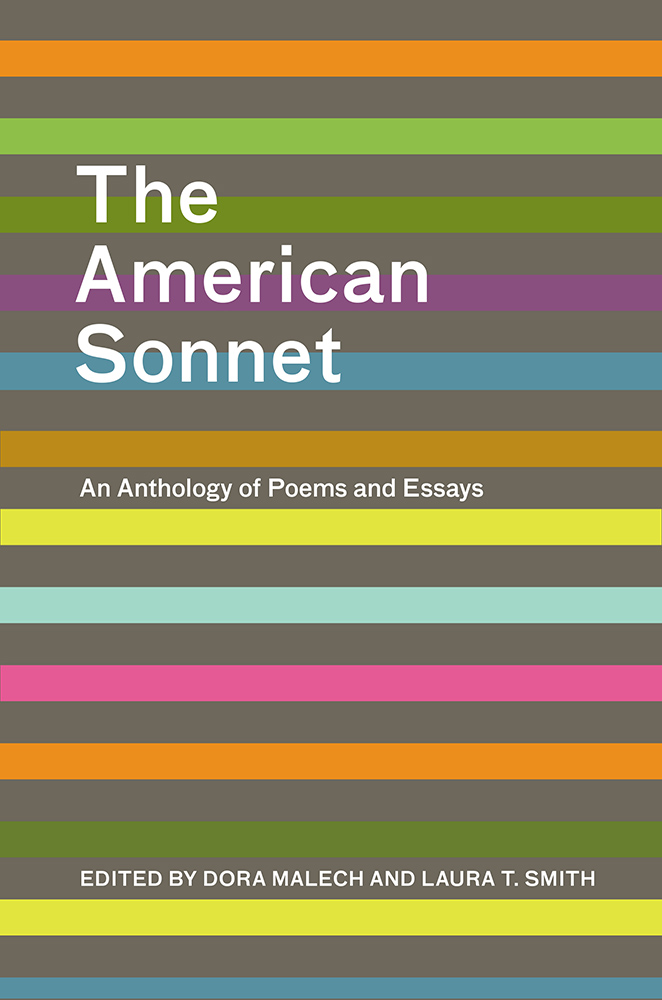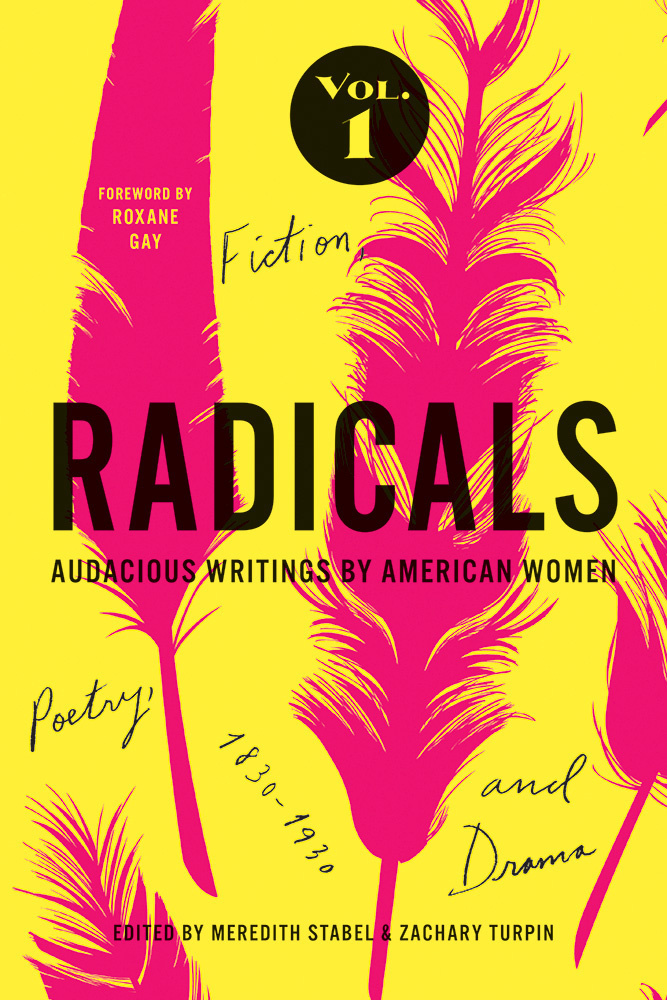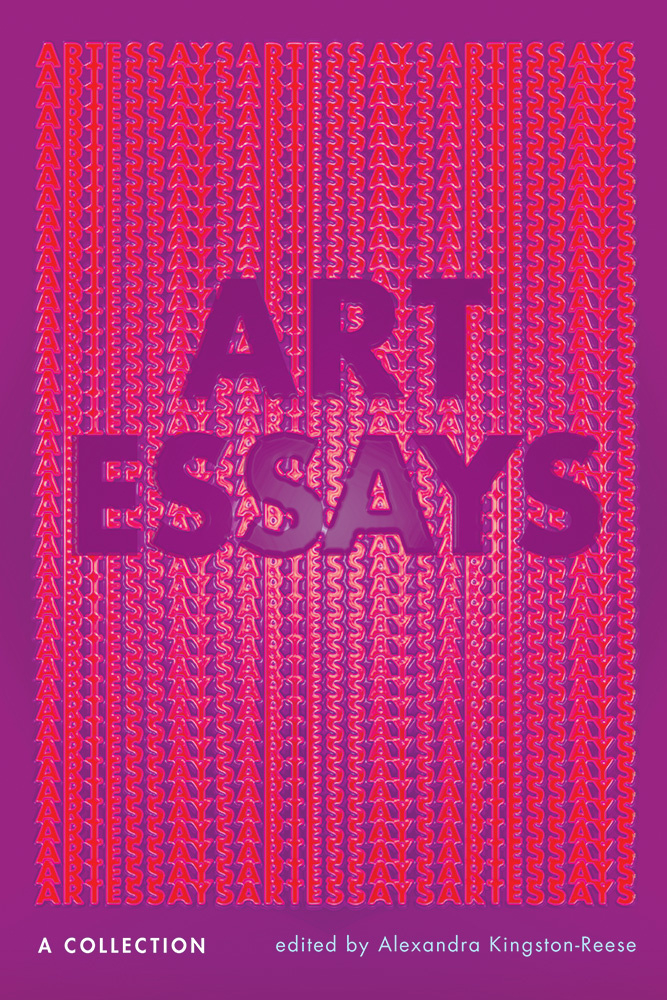Poet and scholar team Dora Malech and Laura T. Smith collect and foreground an impressive range of sonnets, including formal and formally subversive sonnets by established and emerging poets, highlighting connections across literary moments and movements. Poets include Phillis Wheatley, Fredrick Goddard Tuckerman, Emma Lazarus, Paul Laurence Dunbar, Gertrude Stein, Fradel Shtok, Claude McKay, Edna St. Vincent Millay, Ruth Muskrat Bronson, Langston Hughes, Muriel Rukeyser, Gwendolyn Brooks, Dunstan Thompson, Rhina P. Espaillat, Lucille Clifton, Marilyn Hacker, Wanda Coleman, Patricia Smith, Jericho Brown, and Diane Seuss. The sonnets are accompanied by critical essays that likewise draw together diverse voices, methodologies, and historical and theoretical perspectives that represent the burgeoning field of American sonnet studies.
“The American Sonnet will be embraced by all who’ve noted the lack of diverse scholarship on the sonnet, particularly regarding historically underrepresented sonneteers. With this anthology, Malech and Smith have deepened and expanded the range of our thinking on this form. I can’t wait to teach this book—and be taught by it.”—Beth Ann Fennelly, author, Heating & Cooling: 52 Micro-Memoirs
“I can’t imagine a group of people with whom I would be more excited to talk with about the sonnet than the essayists herein, nor talk more illuminating than their essays. And the sonnets themselves cover whatever the essays don’t (more Dunstan Thompson in anthologies, please). This is an ideal anthology.”—Shane McCrae, author, Cain Named the Animal
“With keen observation and rigorous inquiry, The American Sonnet documents and celebrates American poets’ vital contributions to an ancient, global verse form. The poems and essays collected here situate the ‘American sonnet’ within a centuries-long conversation about how poetry happens on the page and in the mind. By centering diverse, living American poets for whom the sonnet is a way to think deeply about social and political questions, this work offers a timely snapshot of our urgent literary moment. The American Sonnet is a feast of discovery for all readers.”—Kiki Petrosino, author, White Blood: A Lyric of Virginia
“’We shall not always plant while others reap,’ promised Countee Cullen; the robust tradition of sonnets he represented is just one of several in this memorable, thoughtful, useful, and sometimes stellar collection’s deeply American braid, reflecting both a panoply of sonnets from U.S.-based writers (and translators!) and a splendid variety of contemporary writings on the form, a modern—but not too modern—pattern designed to make ‘the soul swing open’ (as Mona Van Duyn puts it) ‘on its hinges.’ Sonnets themselves train up to the present day and then introduce up-to-date reflections on the form, from major critics’ takes to up-and-coming poets’ thoughts: Jahan Ramazani on this ‘tightly wound global form,’ Meg Day's ‘Deaf and disabled existence,’ Timo Muller on Harlem Renaissance translation, arguments about neuroqueerness and autism in (wait for it) Robert Frost, and about where on Earth this form is going beyond the pentameter, beyond—or is it back to?—the past. ‘A sonnet is a mother,’ as the great Diane Seuss writes: here are its children.”—Stephanie Burt
“The emphasis here on the experimental and even radical use of the sonnet form, specifically in its American tradition, is what appeals most about this volume. . . . The great benefit is that the featured poems and essays are related; the latter typically analyze sonnets reprinted in the book’s first part. Educators looking for both new sonnets to teach and new approaches to teaching them will be pleased by many of the selections here. . . . This work speaks to the vibrancy of the sonnet in today’s US literary climate.”—American Literary History Online Review
Introduction
POEMS
David Humphreys (1752–1818)
Sonnet III. On the Prospect of Peace, in 1783
Phillis Wheatley (1753–1784)
To the King’s Most Excellent Majesty. 1768.
William Cullen Bryant (1794–1878)
Sonnet—To an American Painter Departing for Europe
Ralph Waldo Emerson (1803–1882)
Woods: A Prose Sonnet
Walt Whitman (1819–1892)
I Saw in Louisiana a Live-Oak Growing
Frederick Goddard Tuckerman (1821–1873)
That boy, the farmer said, with hazel wand
Sometimes I walk where the deep water dips.
Helen Hunt Jackson (1831–1885)
Her Eyes
Emma Lazarus (1849–1887)
The New Colossus
Assurance
Lizette Woodworth Reese (1856–1935)
One Night
George Marion McClellan (1860–1934)
A January Dandelion
James Weldon Johnson (1871–1938)
Plácido’s Farewell to His Mother
Paul Laurence Dunbar (1872–1906)
Slow through the Dark
Alexander Posey (1873–1908)
On the Capture and Imprisonment of Crazy Snake,
January, 1900
Lola Ridge (1873–1941)
Electrocution
Amy Lowell (1874–1925)
The Matrix
Gertrude Stein (1874–1946)
Sonnets That Please
Robert Frost (1874–1963)
Hyla Brook
Alice Moore Dunbar-Nelson (1875–1935)
To Madame Curie
Lucian B. Watkins (1878–1920)
The New Negro
Leslie Pinckney Hill (1880–1960)
“So Quietly”
Mani Leyb (1883–1953)
A Plum
Elinor Wylie (1885–1928)
Sonnet
Fradel Shtok (1888–1952)
Sonnet
Claude McKay (1889–1948)
If We Must Die
America
Edna St. Vincent Millay (1892–1950)
from “Sonnets from an Ungrafted Tree”
Sonnet I
E. E. Cummings (1894–1962)
next to of course god america i
Ruth Muskrat Bronson (1897–1982)
from “Sonnets from the Cherokee”
Louise Bogan (1897–1970)
Roman Fountain
John Wheelwright (1897–1940)
Phallus
Langston Hughes (1902–1967)
from “Seven Moments of Love: An un-sonnet
sequence in Blues”
Two Weeks
Countee Cullen (1903–1946)
From the Dark Tower
Helene Johnson (1906–1995)
A Missionary Brings a Young Native to America
Sonnet to a Negro in Harlem
Elizabeth Bishop (1911–1979)
Sonnet
Sonnet of Intimacy
Muriel Rukeyser (1913–1980)
Sonnet
Robert Hayden (1913–1980)
Frederick Douglass
Margaret Walker (1915–1998)
The Struggle Staggers Us
Robert Lowell (1917–1977)
History
Gwendolyn Brooks (1917–2000)
kitchenette building
the rites for Cousin Vit
A Lovely Love
Dunstan Thompson (1918–1975)
This Tall Horseman, My Young Man of Mars
Mary Ellen Solt (1920–2007)
moonshot sonnet
Mona Van Duyn (1921–2004)
The Beginning
Anthony Hecht (1923–2004)
The Feast of Stephen
James Merrill (1926–1995)
The Broken Home
James Wright (1927–1980)
May Morning
Adrienne Rich (1929–2012)
from “Twenty-One Love Poems”
Rhina P. Espaillat (b. 1932)
Butchering
Sylvia Plath (1932–1963)
Sonnet: To Eva
Ted Berrigan (1934–1983)
Sonnet XXXIV
June Jordan (1936–2002)
Sunflower Sonnet Number Two
Lucille Clifton (1936–2010)
the death of fred clifton
Joan Larkin (b. 1939)
“Vagina” Sonnet
Lyn Hejinian (b. 1941)
The Eye of the Storm
Marilyn Hacker (b. 1942)
I want this love to be resilient
Ellen Bryant Voigt (b. 1943)
The bride is in the parlor, dear confection
Lorenzo Thomas (1944–2005)
MMDCCXIII½
Bernadette Mayer (b. 1945)
Sonnet (You jerk you didn’t call me up)
Kay Ryan (b. 1945)
New Rooms
Say Uncle
Wanda Coleman (1947–2013)
American Sonnet 18
American Sonnet 79
Marilyn Nelson (b. 1946)
Tears, through the patchwork drapery of dream
Aaron Shurin (b. 1947)
I come to cafe, I sit, I bear
Maggie Anderson (b. 1948)
Sonnet for Her Labor
Richard Kenney (b. 1948)
Glass Is Not Crystalline
Agha Shahid Ali (1949–2001)
Postcard from Kashmir
Julia Alvarez (b. 1950)
from “33”
Charles Bernstein (b. 1950)
Questionnaire
Patricia Smith (b. 1955)
from “Salutations in Search Of”
Diane Seuss (b. 1956)
The sonnet, like poverty, teaches you what you can do
Henri Cole (b. 1956)
Arte Povera
Carl Phillips (b. 1959)
Givingly
Simone Muench (b.1969) and Jackie K. White (b. 1961)
Against Teleology
Elizabeth Alexander (b. 1962)
When
Tyehimba Jess (b. 1965)
Millie and Christine McKoy
Natasha Trethewey (b. 1966)
Graveyard Blues
Adrienne Su (b. 1967)
from “Four Sonnets about Food”
Anna Maria Hong
Nude Palette
giovanni singleton
from “The Black and White Sonnet Series”
Philip Metres (b. 1970)
Ismail & Abla to Ahmed, Their Son
Terrance Hayes (b. 1971)
American Sonnet for My Past and Future Assassin
(The song must be cultural, confessional, clear)
American Sonnet for My Past and Future Assassin
(I lock you in an American sonnet that is part prison)
Jen Bervin (b. 1972)
from “Nets”
Nathan Spoon (b. 1972)
Kiddo
Douglas Kearney (b. 1974)
Sonnet Done Red
Joyelle McSweeney (b. 1976)
from “Toxic Sonnets”
Jericho Brown (b. 1976)
Duplex
The Tradition
Brandy Nālani McDougall (b. 1976)
from “Ka ‘Ōlelo: ‘elima”
Natalie Diaz (b. 1978)
My American Crown
Tarfia Faizullah (b. 1980)
Reading Celan at the Liberation War Museum
Craig Santos Perez (b. 1980)
Love in a Time of Climate Change
Tacey M. Atsitty (b. 1982)
Lacing: XII
Meg Day (b. 1984)
from “Boy Corona”: Crucifying
Lo Kwa Mei-en (b. 1987)
The Alien Crown (The conquerers came and wrote the
conquered into being)
Nate Marshall (b. 1989)
African american literature
torrin a. greathouse (b. 1994)
Ars Poetica or Sonnet to Be Written across My Chest & Read
in a Mirror, Beginning with a Line from Kimiko Hahn
ESSAYS
THE NATIONAL AND GLOBAL SONNET
Jahan Ramazani
Self-Metaphorizing “American” Sonnets
Benjamin Crawford
The Rising Poems of America: Nationalistic Origins of the American Sonnet
John James
Origins of Rupture: Emerson, Wheatley, and the Early American Sonnet
Gillian Huang-Tiller
E. E. Cummings: The Iconic Metasonnet and the Cultural Emblem of the American “i/Eye”
Timo Müller
Sonnets into the American: Translation and Transnation in the Harlem Renaissance
Walt Hunter
Claude McKay’s Lonely Planet: The Sonnet Sequence and the Global City
Matthew Kilbane
John Wheelwright, Sound Engineer
Donna Denizé
The Resonances of McKay’s Sonnet Voice, Then and Now
WHOSE SONNET?
Carl Phillips
Whose Sonnet? (A Transgression)
Nathan Spoon
The Sonnet As: Neuroqueerness in the American Sonnet
Ariel Martino
“From the you to me”: Interpersonal Exchange in Margaret Walker’s For My People Sonnet Sequence
Lisa L. Moore
The Sonnet Is Not a Luxury
Jodie Childers
Mapping Radical Poetic Geographies: The Sonnets of Frank X Walker and Maggie Anderson
Michael Dumanis
Subverting the Tradition in The Tradition: Jericho Brown’s Reconceptualization of the Sonnet
Meg Day
Deafing the Sonnet
WRESTLING WITH THE LANGUAGE AND TRADITION
Hollis Robbins
Wrestling with the Language: Dialect and Form in Paul Laurence Dunbar
Zoë Pollak
Sensuous Waste in the Sonnets of Frederick Goddard Tuckerman
Jonathan F. S. Post
Frost in the Company of Shakespeare and Wordsworth
Michael Theune
Strange Voltas
Lesley Wheeler
Partial Visibility: Short-Lined Sonnets
Nate Mickelson
Sonnets and/as Boxes: Ken Taylor, Joseph Cornell, and the New Lyric Studies
Rebecca Morgan Frank
Standing in One Place to Move: The Repeated-Line Sonnet
Anna Lena Phillips Bell
“This resonant, strange, vaulting roof”: Contemporary Sonnets beyond Iambic Pentameter
Diana Leca
Kay Ryan’s Miniature Sonnets
Marlo Starr
Restaging the American “Freakshow” in Olio: Tyehimba Jess’s Syncopated Sonnets
HOME, INTERIORITY, INTIMACY
Stephen Regan
Broken Hearts and Broken Homes: The Desolation of the American Sonnet
Eleanor Wakefield
Helene Johnson’s “Barbaric Songs,” “Choked”
Tess Taylor
But Could a Dream: Form and Freedom in Gwendolyn Brooks’s Domestic Sonnets
Jon Woodson
Gwendolyn Brooks’s Esoteric Sonnet “A Lovely Love” as an Alchemical Metatext
Anna Maria Hong
Three Mothers, Two Eves: Female Virtuosity and Outrage in the American Sonnet
Jordan Finkin
A Plummy Sonnet by Mani Leyb
Abdul Ali
Eulogizing a Generation in Elizabeth Alexander’s “When”
Yuki Tanaka
Animals and the Self in Henri Cole’s Middle Earth



